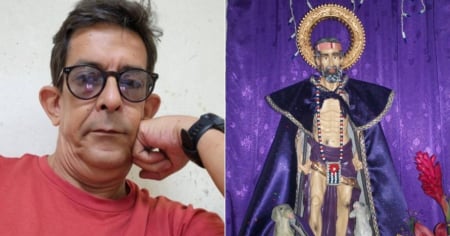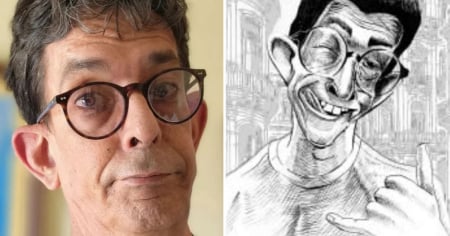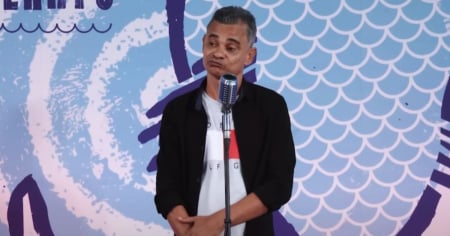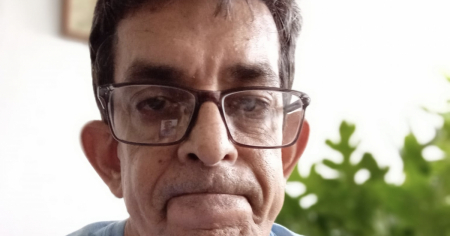
Related videos:
Amid a wave of criticism regarding the government's call for the "March of the Fighting People," Cuban comedian Ulises Toirac shared a reflection on social media about the anticipated turnout for this event.
According to what was stated on Facebook, it is likely that the march will have a high level of participation, despite the prevailing context of public discontent and the severe economic crisis the country is facing.
Toirac emphasized that his forecast is based on recent observations: “I confirmed it in reports of government visits to various towns across the country. Places where blackouts are the norm of daily life, not to mention other shortages. People (without being summoned) came out cheerfully to greet the visitors,” he remarked, alluding to the government's ability to mobilize people even under the most precarious circumstances.
The comedian also recalled the May Day march, characterized by the "joy and celebration" that, according to him, reflects the use of "springs and coordination mechanisms" by the regime to ensure attendance.
“The Government has resources to transport and provide or sell products during the mobilization (that still attracts attention, even if it sounds a bit ‘lame’),” he added sarcastically.
Toirac pointed out that the national public opinion, through images and videos carefully selected by official media, will likely perceive the march as a "resounding success," said the comedian, alluding to the narrative typically used by the authorities during "reaffirmation" events.
In his analysis, he concluded that the march would not have been organized without the certainty that it could be presented as a propagandistic victory: “In fact, if there weren't confidence in a 'demonstrable' 'success', it wouldn't have even been called.”
The call for the march, announced by leader Miguel Díaz-Canel as a response to what he described as a "hostile policy" from the United States, has sparked frustration and criticism on social media.
However, many people have questioned the effectiveness of this type of mobilization in a context of power outages, food shortages, and an unprecedented economic crisis.
Toirac, with his signature critical tone, also referred to the absence of an organized opposition that could present an alternative stance: “There is no leadership capable of promoting another viewpoint now or in the future.”
At the same time, he advised his followers to temper their expectations: “Don’t expect the opposite and avoid a gastric upset or a blood pressure imbalance. These are the consequences of a whole jumble of things, so drink water; what you really have is thirst.”
The "March of the Fighting People," scheduled for this Friday, December 20, following the closing of the National Assembly of People's Power session, has been presented by the regime as a demonstration of resistance and unity in the face of adversity.
A recent survey conducted on social media by CiberCuba highlighted the significant disinterest of the Cuban population regarding the March of the Fighting People, organized by the government to demonstrate support for the regime.
According to the results obtained, the majority of participants prefer to leave the country rather than attend the official mobilization.
Similarly, following the march called by the Cuban leader, "Que vaya Sandro" has gone viral—a song that criticizes Díaz-Canel's initiative and the lifestyle of the ruling class.
Frequently asked questions about the "March of the Fighting People" in Cuba and the criticism by Ulises Toirac
Why does Ulises Toirac believe there will be a strong turnout at the "March of the Combatant People"?
Ulises Toirac predicts that the march will see high participation due to the Cuban government's ability to mobilize people even in challenging circumstances. He argues that the regime employs "springs and coordination mechanisms" to ensure attendance, and that the march would not have been called without the assurance that it could be presented as a propaganda success.
What does Ulises Toirac think about the current economic and social situation in Cuba?
Ulises Toirac has expressed a critical stance on the situation in Cuba, indicating that the country is experiencing a severe economic and social crisis. The comedian describes a vicious cycle of resource shortages that exacerbates the situation and criticizes the lack of willingness to implement structural changes. He also emphasizes the absence of an organized opposition that could provide an alternative stance to the current government.
How do Cubans use social media to express their discontent with the government?
Social media has become a key space for Cubans to express their discontent with the government. Citizens use these platforms to criticize government policies and to question the effectiveness of events like the "March of the Combatant People." This digital environment allows users to share their opinions and organize around demands for real change and solutions to the country's problems.
What criticisms has the "March of the Fighting People" received from the Cuban population?
The call for the "March of the Fighting People" has been criticized by many Cubans who question its usefulness amid a severe economic crisis. The criticisms focus on the lack of basic necessities such as food and electricity, with many citizens believing that these marches are merely government propaganda tactics to showcase support that isn't genuine. Additionally, it is noted that participation is often driven by job-related threats.
Filed under:






